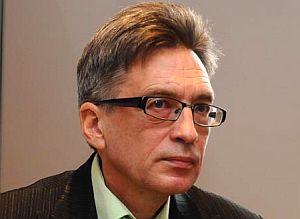Analytics, Direct Speech, Economics, EU – Baltic States, Financial Services, Lithuania
International Internet Magazine. Baltic States news & analytics
Tuesday, 27.01.2026, 11:41
Vareikis: the euro is a political and ideological project
 Print version
Print version |
|---|
The European Union (EU) itself was a political project, a derivative, which had been developed with American effort against the aggressive Soviet Union. Subsequently, the EU expanded for geopolitical reasons. Numerous authoritarian countries became democratic and joined in: Spain, Portugal, and Greece. Around 1991, a question on how to further unify the EU countries was raised. Then, the euro was found. Therefore, the euro is not an economic project; it was originally a political project, reports en.delfi.lt.
Agreement on the euro is one-way, which makes breaking off problematic. Once a country is in, exit from the European Union is not mentioned as an option in any documents. The cost of exit is too high. We have experienced what happens when major political compounds split into parts as a result of the withdrawal of smaller parts. The Soviet Union could not proceed without the Baltic region, and Yugoslavia – without Slovenia.
The euro in Lithuania is an ideological project. One of the arguments for it is that it will ensure our security, which has, in fact, nothing to do with the economy.
In end of 2013, after the re-election of Angela Merkel to the German chancellorship, Harper’s magazine encouraged German and French political analysts and sociologists to debate the future of the EU and the euro. The majority agreed that the euro will continue into the next decade, but in the long term, its future is uncertain.
The Euro zone grows by accepting countries with radically different political systems and historical backgrounds. In comparing Bulgaria and Luxembourg in terms of economic development, it is difficult to comprehend that they belong to the same economic zone.
Emmanuel Todd, a French historian, anthropologist, and political theorist in the Paris National Institute of Demographic Studies, claims that the euro is a big mystery to him and it is totally inconsistent with the French cultural and historical traditions. According to him, all countries in Europe, except for Germany, realise that the euro is a huge failure. So why does it still exist?
Todd asserts that it is not an economic issue, but rather an ideological issue. German domination in Europe (Germany makes up 40% of the Eurozone economy) is only possible because France agrees with it. According to him, instead of the Euro zone, we now experience the power of the German zone. It’s like a peaceful parody of the past, but it’s still the same past.
“How long will the euro project last and how long will the people believe in it, despite the fact that all rational reasons for it will cease to exist?” asks London School of Economics professor John F. Gray. The answer is complicated.
“The remaining believers in this project that I have met outside Germany are the people in post-communist countries, namely Poland and the Baltic states. The reason is obvious: to them, the European Union and the Euro zone represent normality and order. After the long history with communism, they now want to be normal European countries,” Gray explains.








 «The Baltic Course» Is Sold and Stays in Business!
«The Baltic Course» Is Sold and Stays in Business!

